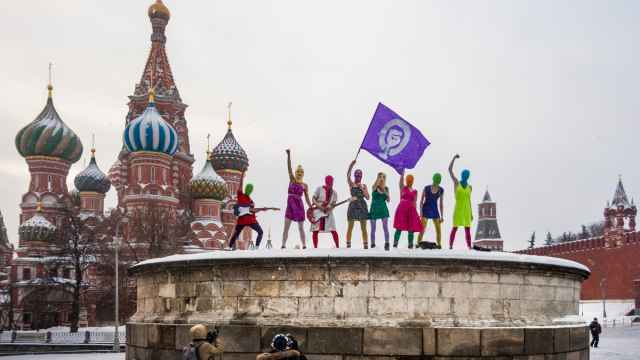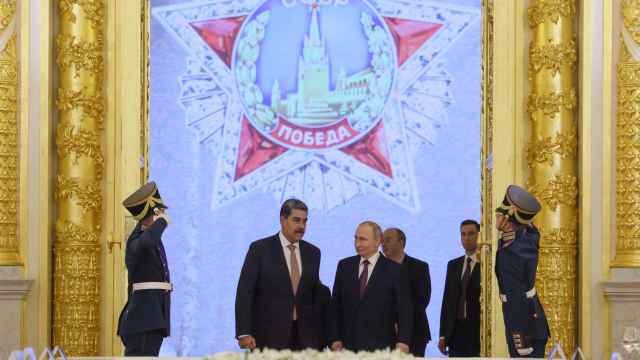Честь имею: I have the honor of; goodbye
A while back, when everyone was debating the fate of Mayor Yury Luzhkov, I remembered a phrase in Luzhkov’s letter to President Dmitry Medvedev. The letter, posted online, ended with: Честь имею (literally, “I have honor”). Some Russian speakers thought it was a polite closing. Others thought it was meant as an insult. After wishing for the nth time that Russian speakers could come to a consensus about their language, I decided to do some research. When all else fails, check a dictionary.
Dictionaries are helpful here — up to a point. They make it clear that честь имею was once part of Russia’s polite daily lexicon, similar to what “I have the honor of … ” is among English speakers. Честь имею поздравить вас с праздником Рождества Христова (I have the honor of wishing you a merry Christmas). Честь имею проводить вас в магазин (I have the honor of escorting you to the store).
In correspondence and communication with state dignitaries, stressing honor was always de rigueur. Some of it was a little over the top: Честь имею доложить вашему превосходительству: поезд идёт через сорок минут! (I have the honor of informing Your Excellency that the train leaves in 40 minutes!) Some of it was way over the top, like the way Alexander Pushkin signed a letter to the tsar (via Count Alexander von Benckendorff): С глубочайшим почтением и совершенной преданностию честь имею быть, милостивый государь, Вашего превосходительства покорнейшим слугою (With the deepest respect and absolute devotion, I have the honor, kind Sir, of being Your Excellency’s most humble servant).
Honor was a key concept among pre-revolutionary officers. When reporting to a superior, an officer might have said: Честь имею явиться (I have the honor of reporting for duty). When departing, an officer said simply: Честь имею. The verb откланяться (to take your leave) was left out but understood. A friend who is a descendent of a White and Red Army officers recalls that her father and grandfather always ended telephone conversations with Честь имею — a respectful, proper way to say “goodbye.”
With all this honor being bandied about, exactly who is honoring whom gets a bit confusing. On the one hand, the person who utters a “честь имею + verb” phrase is showing deference and respect to another person. On the other hand, uttering the phrase indicates a certain dignity and allegiance to a code of behavior and honor. So both the honorer and the honoree are seen to be, well, honorable people.
Lately however, some Russian speakers seem to have forgotten about this elaborate dance of honor and the verb — implied or explicit — after the phrase имею честь. They understand the bare phrase честь имею to be one of assertion: I am an honorable person. Or they understand it as a kind of challenge, as if the next phrase might be a call to a duel.
So what did Luzhkov have in mind when he ended his letter to Medvedev, Честь имею? Was it an old-fashioned form of goodbye, an assertion of personal honor or a challenge? Or was it meant to be ambiguous?
Judging by the tone of the letter as a whole, I’d vote for a mix of personal promotion with a dash of challenge: “I have the honor to remain … Yury Luzhkov.”
Michele A. Berdy is a Moscow-based translator and interpreter. A collection of columns, “The Russian Word’s Worth,” was published by Glas.
A Message from The Moscow Times:
Dear readers,
We are facing unprecedented challenges. Russia's Prosecutor General's Office has designated The Moscow Times as an "undesirable" organization, criminalizing our work and putting our staff at risk of prosecution. This follows our earlier unjust labeling as a "foreign agent."
These actions are direct attempts to silence independent journalism in Russia. The authorities claim our work "discredits the decisions of the Russian leadership." We see things differently: we strive to provide accurate, unbiased reporting on Russia.
We, the journalists of The Moscow Times, refuse to be silenced. But to continue our work, we need your help.
Your support, no matter how small, makes a world of difference. If you can, please support us monthly starting from just $2. It's quick to set up, and every contribution makes a significant impact.
By supporting The Moscow Times, you're defending open, independent journalism in the face of repression. Thank you for standing with us.
Remind me later.







